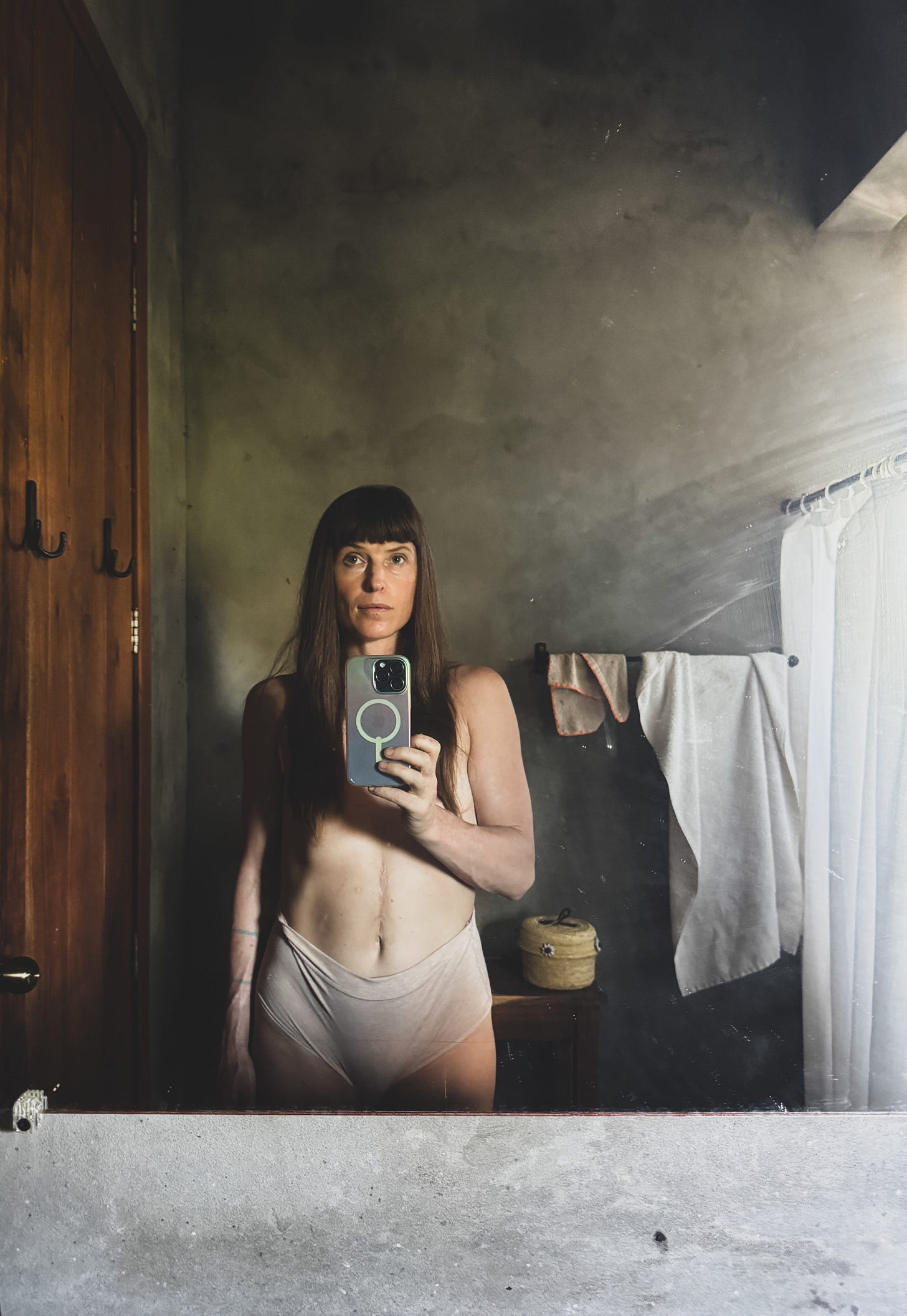Private Parts
Stories About My Yoni
I’m sitting in the hot bath with my mother and little sister. I’m six years old. My sister and I take turns sliding down mum’s enormous, slippery, soapy belly, an activity that she tolerates wearily at this late season in her pregnancy.
*
I position myself at the apex, let loose, then hit the water with a splash. As I’m shifting myself around awkwardly in the close quarters of the enamel postwar bathtub, readying myself to ascend her mountainous womb once again, I glimpse the dark tangle of her pubic hair and the deep red petals of her precious core, protruding voluptuously. Mum, I say. Your vagina looks like roast beef! Why doesn’t mine?
*
“Vulva” hasn’t yet come into fashion, and “vagina” is the term that my mother has bravely taught her own daughters to use. She herself was raised by a woman who didn’t have the psychological or emotional capacity to voice any word out loud at all to describe her genitals, but my mother is determined to do things differently, and to never apologize explicitly or implicitly, for her femaleness.
*
In response to my question, my mother bursts into a bell-like gale of laughter—a laugh without shame, or embarrassment or any sense of reprimand whatsoever, and she says, Yes it really does look like roast beef, doesn’t it? This is just how our bodies look once we have babies—your vagina will change too, as you get older, and especially after you give birth.
*
I’m fascinated. Enthralled. How delightful it is that life will offer me, among other things, the opportunity to become a woman, and then a mother, which (among other things) means that my vagina will one day look like roast beef too. This is clearly something to look forward to. My mother is beautiful.
My first birth is a firewalk.
*
After almost forty-four weeks of pregnancy, my waters break one morning, and following several days of intense sensations, the crescendo builds to the necessary relinquishing of everything I never needed.
*
I begin to push, and this continues for over eight hours throughout which I scream hysterically. When I’m finally shattered and spent, stripped to my essence, I roar my beautiful baby into the world in a state of primal abandon tinged with sheer terror.
*
In those heady moments following the ecstatic shock of my boy’s emergence, I feel overwhelming adoration…and then, as the rush subsides, a terrible ache.
*
Two hours after my child and I bring each other forth, my midwife helps me to the toilet to pee for the first time, and the pain of urinating through my ravaged yoni is overwhelming—far more outrageous, in many ways, than the agony of birth. I sob, overwhelmed by a sense of panic.
*
I have been annihilated—torn apart. My sacred body is a wreck. The violence of my baby’s entry has ripped the left side of my labia in half, horizontally, and there is a deep gash into the interior wall of my vaginal opening, following the circular muscle fibres. The right labium is swollen, though relatively “normal” looking, but on the left there are now two dangling, protruding flaps of skin, and the entrance to my body is distended, bloody, and raw.
*
I am deeply concerned. I look deformed and freakish. But more importantly, it’s obvious that my body will never function properly again, and my already-disastrous marriage will be further damaged by what will clearly be a case of lifelong sexual dysfunction.
*
My midwife, however, maddeningly, refuses to suture me. She assures me that my body will heal. Not only that, she suggests that sutures will only cause more pain in the immediate, and will likely extend the time required to fully heal, potentially leading to a much greater measure of long-term discomfort. She calmly suggests that I will be better off simply allowing my body to recover spontaneously.
*
I doubt this, but I’m also too tired to argue.
*
Weeks later, I finally take myself to a walk-in clinic to get my labia and vaginal opening fixed, but the doctor looks down at me pityingly with a tinge of horror and says, “I’m so sorry, but it’s far too late to give you sutures. You’re going to need reconstructive surgery for this.” I weep again.
*
At age twenty, after my first home birth and an upbringing that didn’t ever include painkillers, antibiotics, or routine interactions with the medical system, I’m already disinclined to submit to (or respect) the diktats of experts, but in this case, I assume the doctor has a point.
*
But instead of booking an appointment with a gynaecological plastic surgeon—which really isn’t my style—I resign myself to a life of celibacy and ostracism. Get thee to a nunnery, etc.


